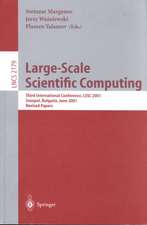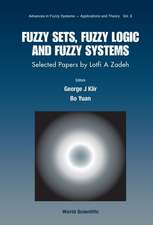Science and Engineering Projects Using the Arduino and Raspberry Pi: Explore STEM Concepts with Microcomputers
Autor Paul Bradt, David Bradten Limba Engleză Paperback – 21 iun 2020
Areas explored include force/acceleration, heat transfer, light, and astronomy. You'll work with advanced tools, such as data logging, advanced design, manufacturing, and assembly techniques that will take you beyond practical application of the projects you'll be creating.
Technology is ever evolving and changing. This book goes beyond simple how-tos to teach you the concepts behind these projects and sciences. You'll gain the skills to observe and adapt to changes in technology as you work through fun and easy projects that explore fundamental concepts of engineering and science.
What You'll Learn
- Measure the acceleration of a car you're riding in
- Simulate zero gravity
- Calculate the heat transfer in and out of your house
- Photography the moon and planets
Who This Book Is For
Hobbyists, students, and instructors interested in practical applications and methods to measure and learn about the physical world using inexpensive Maker technologies.
Preț: 299.04 lei
Preț vechi: 373.80 lei
-20% Nou
Puncte Express: 449
Preț estimativ în valută:
57.22€ • 59.74$ • 47.36£
57.22€ • 59.74$ • 47.36£
Carte disponibilă
Livrare economică 15-29 martie
Preluare comenzi: 021 569.72.76
Specificații
ISBN-13: 9781484258101
ISBN-10: 148425810X
Pagini: 230
Ilustrații: XXI, 238 p. 126 illus.
Dimensiuni: 155 x 235 mm
Greutate: 0.37 kg
Ediția:1st ed.
Editura: Apress
Colecția Apress
Locul publicării:Berkeley, CA, United States
ISBN-10: 148425810X
Pagini: 230
Ilustrații: XXI, 238 p. 126 illus.
Dimensiuni: 155 x 235 mm
Greutate: 0.37 kg
Ediția:1st ed.
Editura: Apress
Colecția Apress
Locul publicării:Berkeley, CA, United States
Cuprins
Chapter 1: Key Technology Tools.- Chapter 2: Data Logging Basics.- Chapter 3: Physics and Mathematics Basics.- Chapter 4: Simple Science and Engineering Projects.- Chapter 5: Advanced Physics and Mathematics for Science and Engineering.- Chapter 6: Time/Condition Dependent Projects.- Chapter 7: Light and Imaging Projects.- Appendix A.
Notă biografică
Paul Bradt has a BS in Computer Science from University of Houston Clear Lake. He currently runs a small company that provides IT support and works as a contractor developing various computer programs. He has worked extensively with microcomputers like Arduino and Pi and believes them to be excellent tools for developing an understanding of how electronic components and hardware interact in integrated systems. He also believes they are very useful as teaching aids in learning the basics of computer programming. Paul likes to promote STEM concepts through hands-on techniques.
David Bradt has a BS in Mechanical Engineering from New Mexico State University with many years of experience in engineering, safety, reliability, industrial equipment, petrochemical and NASA. He likes using tools like the Raspberry Pi and the Arduino to capture data to help form the basis for informed analysis of the physical world. He enjoys building all kinds of systems and is an amateur astronomer.
Textul de pe ultima copertă
Hone your understanding of science and engineering concepts with the versatile Arduino microcontroller and powerful Raspberry Pi mini-computer. The simple, straightforward, fun projects in this book use the Arduino and Raspberry Pi to build systems that explore key scientific concepts and develop engineering skills.
Areas explored include force/acceleration, heat transfer, light, and astronomy. You'll work with advanced tools, such as data logging, advanced design, manufacturing, and assembly techniques that will take you beyond practical application of the projects you'll be creating.
Technology is ever evolving and changing. This book goes beyond simple how-tos to teach you the concepts behind these projects and sciences. You'll gain the skills to observe and adapt to changes in technology as you work through fun and easy projects that explore fundamental concepts of engineering and science.
You will:
- Measure the acceleration of a car you're riding in
- Simulate zero gravity
- Calculate the heat transfer in and out of your house
- Photography the moon and planets
Caracteristici
Conduct science and engineering experiments with the Raspberry Pi and Arduino Measure and simulate real world and off-world conditions Go beyond practical application to understand the theories and concepts behind these projects
























